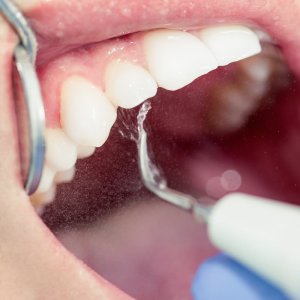Are your teeth sensitive after cleaning at the dentist? Even if you have healthy gums and teeth, a little tenderness and sensitivity is possible after you get your teeth cleaned by a dental hygienist.
And if you have gum disease, thinning enamel, or decay, then you may feel quite a bit of tenderness and swelling afterward for a few days and up to a week.
In this article we’ll focus on two main points:
- Why your teeth are sensitive after a cleaning
- What you can do to avoid sensitive teeth in the future
Why are my teeth sensitive after a cleaning?
It’s not uncommon for teeth to feel sensitive after going to the dentist for a cleaning, but this sensitivity should be fairly short-lived. After a few days, it should be a thing of the past.
Some people feel sensitivity in their teeth, and others in their gums, and if you’re really unlucky, you’ll have both sensitive teeth and gums after a cleaning.
So why does this happen?
Let’s start with the gums. When you go to the dentist for a cleaning and an exam, your dentist will use their scaling tool to poke and prod your gums a bit, checking for decay and other issues along and underneath the gumline.
If your gums aren’t healthy, and you have gingivitis or gum disease, then you will likely experience swelling and bleeding.


After the exam, your dentist will remove the plaque and tarter around the gums, which will also leave them feeling pretty tender to the touch if they weren’t healthy to begin with.
And now the teeth: Teeth are covered in hundreds of tubules, or pores. Inside of these tubules are the nerves of these teeth, and with poor hygiene habits, these tubules become covered by a buildup of plaque and tartar.
This blocks the tubules and any access to the nerves. But when you get a cleaning, the tubules open back up and the nerves are exposed.
Another reason is that many people who have sensitive teeth use a special toothpaste that helps to block these tubules as well to protect the exposed nerves. During a cleaning at the dentist, the barrier provided by this toothpaste is also scrubbed off, leaving the nerves exposed again.
Teeth sensitive after deep cleaning


If you’ve got good oral hygiene habits and healthy gums and teeth, then you probably won’t feel much sensitivity after a regular cleaning and checkup with your hygienist.
But, if you need a deep cleaning, the side effects tend to worsen. Deep cleanings involve scaling and root planing and are especially recommended for patients who have gum disease.
During a deep cleaning, you’ll likely get a local anesthetic, and then your hygienist will remove tartar using the scaler, focusing especially on the gumline. They will then reattach your gums to your teeth, eliminating any pockets. Not just sensitivity, but soreness and pain are common after these visits.
This discomfort is temporary, and ultimately a deep cleaning will help you recover from gum disease, so if you’re nervous about the pain, let your dentist know and they can be as gentle as possible.
Common causes of tooth sensitivity after cleaning
Have a look at the list of these common reasons for if you feel like your teeth are more sensitive after a cleaning:
- Gum disease: If you have gum disease, your gums will feel swollen and tender after a cleaning. Make sure to follow the treatment guidelines from your dentist
- Thinning enamel: Thin enamel leaves your nerves more exposed and is a common reason for feeling sensitivity in general
- Brushing too hard: Avoid brushing too hard always, and especially after a dental cleaning, as this can worsen sensitivity
- Whitening toothpaste: If you regularly use a whitening toothpaste, you may want to lay off a bit after a cleaning, as these tend to be more abrasive
Teeth sensitive weeks after cleaning
Your teeth may be sensitive and your gums tender up to a week after your dental cleaning, although that should really be the limit. If you feel unusual pain or sensitivity weeks after cleaning, then call your dentist as this could be a sign that something is wrong.
Avoiding tooth sensitivity after cleaning
Stay away from food and drinks that could potentially aggravate the sensitivity. This includes:
- Coffee and tea
- Alcohol
- Fruit juices — especially citrus fruits
- Cold or hot beverages — especially if your tooth is sensitive to cold or hot stimuli already
- Tooth sensitive to air
Additionally, you should avoid any whitening treatments after a dental cleaning — at least until your sensitivity is gone. This includes whitening toothpaste, whitening strips, kits, gels, and any other whitening treatments.
Remedies for sensitive teeth after cleaning
Your dentist may recommend that you take an over-the-counter pain medication if your gums are really swollen, and you might want to try rinsing with salt water for relief from tooth sensitivity.
Otherwise, the best remedy is to take proper care of your teeth, so that your gums are healthy and don’t become sensitive during your next cleaning.
This means brushing twice per day and flossing at least once per day. You may want to add an oral irrigator to your routine as well. Use a soft-bristled toothbrush and an enamel-strengthening fluoride toothpaste if you are prone to tooth sensitivity.
If you’ve had a filling after your cleaning, that could be causing your tooth sensitivity as well.
Conclusion
It’s common to experience a bit of sensitivity after you go to the dentist for a cleaning, and that’s if your teeth and gums are healthy, and you follow a proper oral hygiene routine.
But if you have gum disease and decay, then you’ll notice that you have swollen and tender gums for a few days after your cleaning. Deep cleanings will cause even more discomfort — during the procedure, your dentist will give you a local anesthetic, and afterward, they can give you tips for relief once you’re at home.
To avoid more sensitivity in the future, the best thing you can do is to start taking better care of your teeth now.
FAQs
Is it normal to have sensitive teeth after cleaning?
It’s normal to have a bit of sensitivity after cleaning, but if your mouth is healthy, then this discomfort should be minimal. If your gums and teeth aren’t healthy, this discomfort will increase.
How long does tooth sensitivity last after cleaning?
Tooth sensitivity may last for a few days after a cleaning, and up to a week, especially if you had a deep cleaning. If you feel more pain that lasts longer than this, you should call your dentist.




